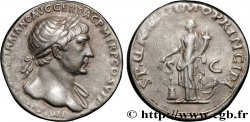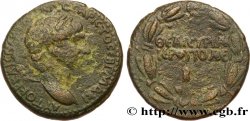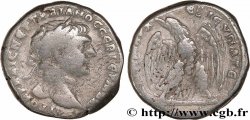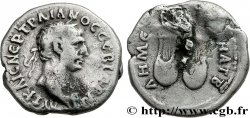brm_458307 - TRAJANUS Denier
Not available.
Item sold on our e-shop (2018)
Price : 200.00 €
Item sold on our e-shop (2018)
Price : 200.00 €
Type : Denier
Date: 117
Mint name / Town : Roma
Metal : silver
Millesimal fineness : 900 ‰
Diameter : 17 mm
Orientation dies : 6 h.
Weight : 3,36 g.
Rarity : R2
Coments on the condition:
Bel exemplaire avec un joli revers inhabituel. Patine grise de collection ancienne
Catalogue references :
Obverse
Obverse legend : IMP CAES NER TRAIAN OPTIM AVG GERM DAC PARTHICO.
Obverse description : Buste lauré et drapé de Trajan à droite vu de trois quarts en arrière (A*21).
Obverse translation : "Imperatori Caesari Nervæ Traiano Optimo Augusto Germanico Dacico Parthico" , (A l'empereur César Nerva Trajan, le Meilleur, Germanique, Dacique, Parthique).
Reverse
Reverse legend : P M TR P COS VI P P S P Q R.
Reverse description : Buste radié et drapé de Sol à droite vu de trois quarts en avant (A01).
Reverse translation : "Parthico Pontifico Maximo Tribuniciæ Potestate Consulo Sexti Patri Patriæ Senatus Populus Que Romanus" (au Parthique, grand pontife, revêtu de la puissance tribunitienne, consul pour la sixième fois, père de la patrie, au nom du Sénat et du Peuple romain).
Commentary
Ce denier commémore la victoire parthique de l’empereur.








 Report a mistake
Report a mistake Print the page
Print the page Share my selection
Share my selection Ask a question
Ask a question Consign / sell
Consign / sell
 Full data
Full data



